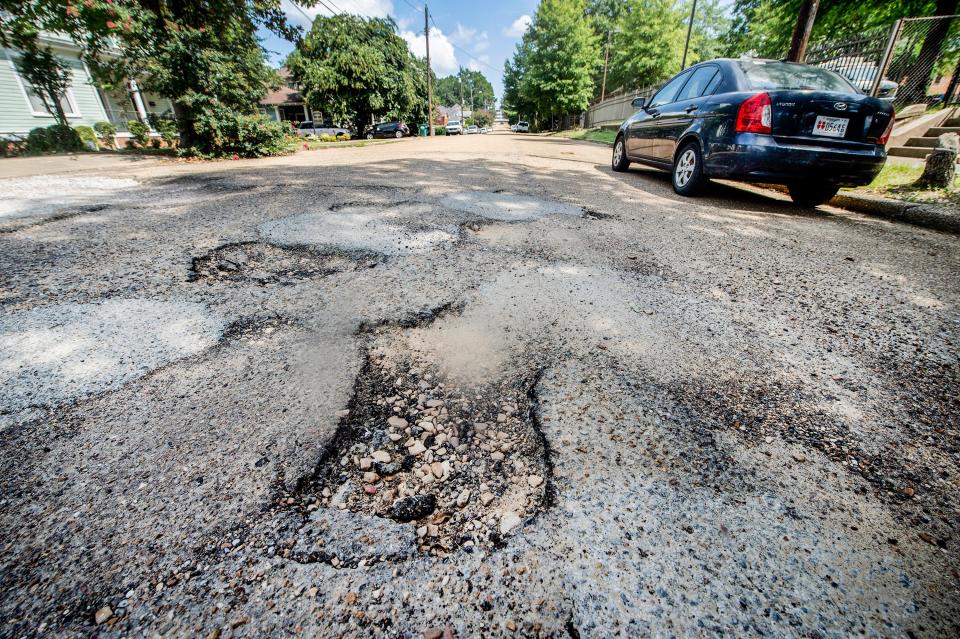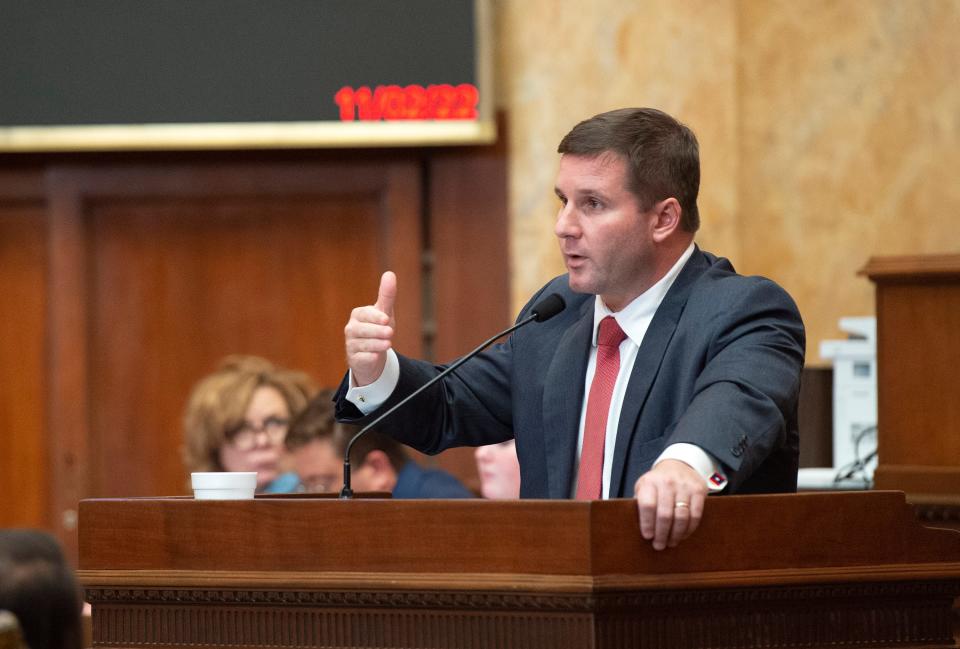Jackson sales tax could be required to be used on water and sewer, not roads and bridges
A change to Jackson's sales tax rules would require a portion of that money to be spent on water and sewer projects, if a bill that passed the Mississippi House on Thursday becomes law.
A 1% increase to Jackson's sales tax was approved by the legislature and the city's residents in 2014 with the resulting revenue earmarked for infrastructure projects — roads, bridges, water and sewer.
House Bill 1168 would change that, instructing the commission created in the 2014 bill to use those funds, which equaled $120 million between 2014 and 2022, on water and sewer exclusively.

Ways and Means committee chair Rep. Trey Lamar, R-Senatobia, brought forward the bill on the House floor, saying it was intended to quickly put revenue in the hands of the city's water administrator Ted Henifin.
"The conservator if you will, I think that's the right phrase, is looking for money right now. Right now. Today. I think there's been multiple articles written that he needs cashflow, money in the bank, today for water, and so he's talking about increased taxes and changing the way water is used and all this based on the value of property because he needs money right now," Lamar said, knocking on the dais. "Here's some money right now that we can prioritize for water in the city of Jackson."

Lamar said he did not speak with Henifin or Mayor Chokwe Antar Lumumba before filing the bill, but he did speak with a city lobbyist, along with business owners. Lamar said Henifin is "welcome in my office any time." He also said he has not spoken with anyone on the commission "lately."
Statewide candidates: The field is set for 2023 Elections in Mississippi. See who is running in statewide races
A number of Democratic representatives spoke against the bill. Many of them said that the money a 1% sales tax brings in would do little to address Jackson's significant water challenges, but that amount can have a real impact on roads and bridges. Jackson is slated to receive at least $600 million from the federal government for its water system, leading many of those lawmakers to wonder why funds should be taken away from roads and bridges at this time.
"The idea that Jackson has a billion-dollar wastewater problem, and a seven or eight hundred-million-dollar water problem, and you're going to take 15 or 16 million-dollars and dump it in a billion dollar hole doesn't make any sense," Rep. Robert Johnson, D-Natchez, said. "So, with $15 million, you could do 15 miles of overlay on a road. Or you could take it and fix potholes in 20 or 30 miles of road in Jackson. That would actually do some good."
Rep. Edward Blackmon, D-Canton, said if the legislature is concerned about Jackson's water system, it should allocate funds to help, not take them away from other infrastructure projects.
"What you just said doesn't line up with the fact that this legislature has the power right now to appropriate that money you're talking about through the surplus fund that we have," Blackmon said. "Why wouldn't this legislature appropriate money directly to Jackson if you're so concerned about the water and the sewer coming up on the ground?"
Lamar said he knew where Blackmon was going with that argument.
"I'll just say I'm not the appropriations chair," Lamar said.
Rep. De'Keither Stamps, D-Jackson, said limiting how the tax revenue is used could violate the referendum that Jackson voters passed in 2014.
"I'm very familiar with it, Mr. Chairman, because I wrote it, and in that narrative it states what the usage of these funds would be for, and it was broader than what this bill says. Do you believe it would be a violation of what the citizens actually voted on, if we passed this measure?" Stamps asked Lamar.
Lamar said that since water and sewer were included in the language that Jackson voters approved, it would not be improper to prioritize those aspects.
HB 1168 is one of a number of bills that would impact Jackson which are written by representatives from other areas. Lamar has also filed a bill that would create an unelected state-run court system within Jackson. During a hearing last month on that bill, Lamar said that the capital city "doesn't just belong to the citizens of Jackson."
Those comments came up again during debate Thursday, when Rep. Zakiya Summers, D-Jackson, said to Lamar, "according to you this is 'our' capital city."
"I agree with that," Lamar said.
Rep. Bo Brown, D-Jackson, said that the legislature should listen to representatives from Jackson when voting on issues concerning the city.
"Cities and counties around this state, we don't, the delegation from Jackson don't come in and say 'You don't need this, or you don't need that.' We vote based on the needs that you all present to us. Here today I'm hearing the representatives from Hinds County and Jackson dictate to you all what we need in this city, and everybody seems to have a deaf ear to it," Brown said. "Let us determine our destiny based on what our citizens and the governmental leadership tells us they need."
The bill passed the House 76-41. An amendment failed that would revert the funds back to its original purpose once federal funding arrives, as did another that would give the commission more discretion over how to spend the funds.
This article originally appeared on Mississippi Clarion Ledger: Infrastructure sales tax changes might be coming in Jackson MS
